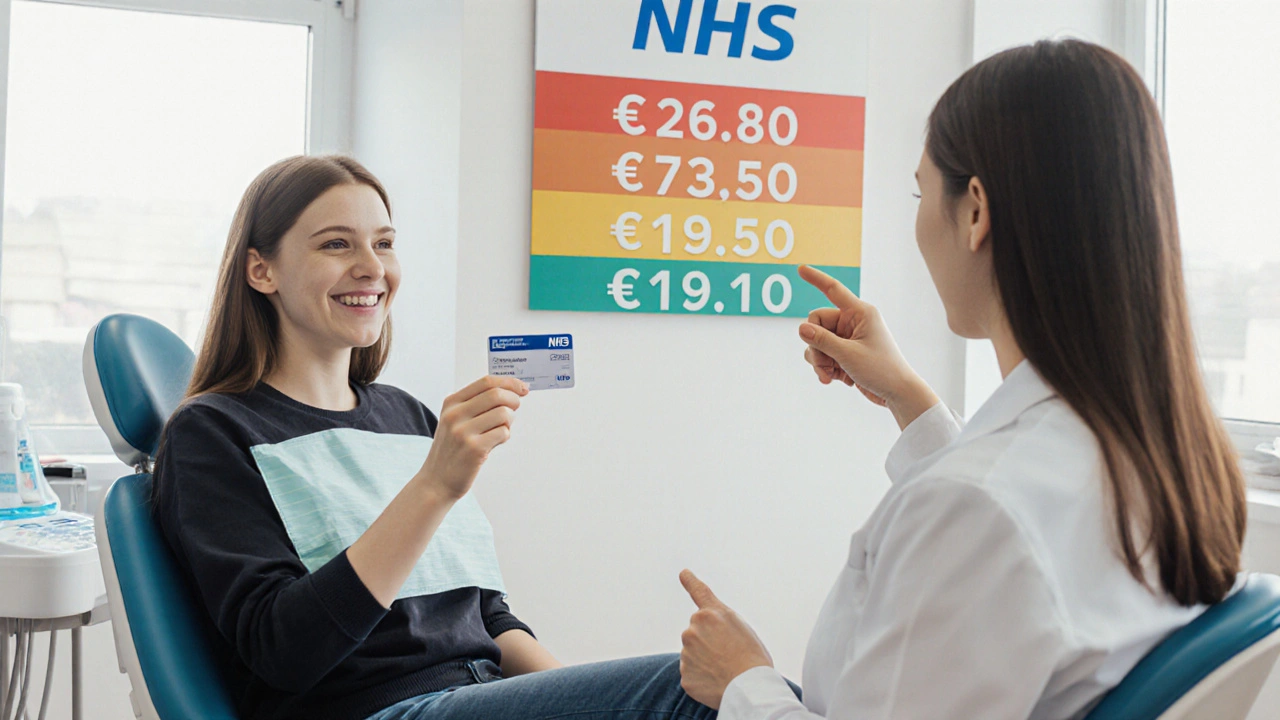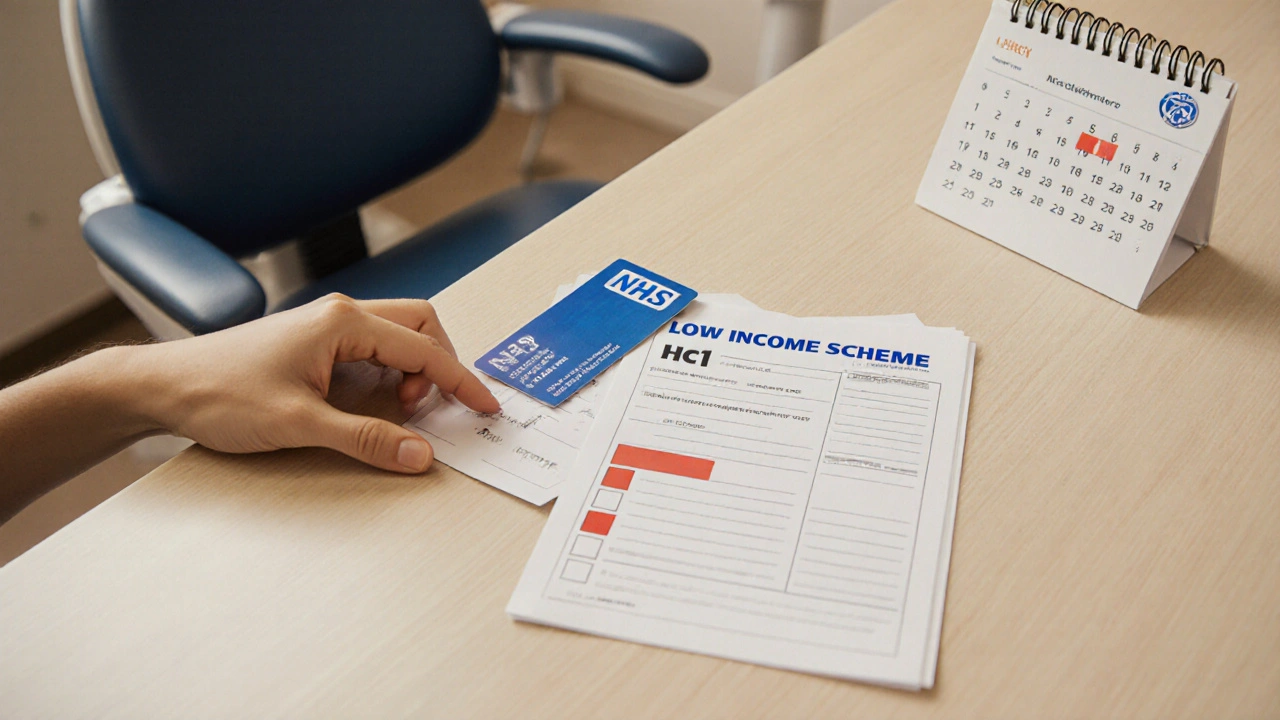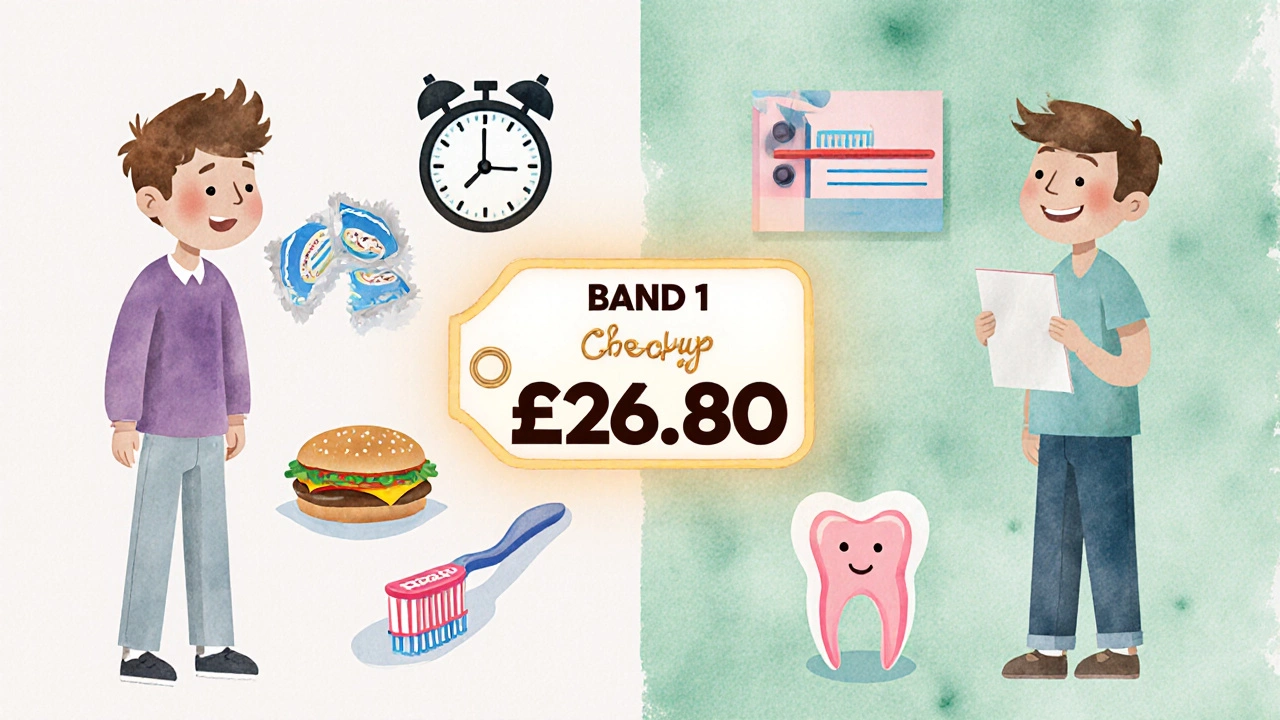
If you're a student in England and you need dental care, the cost can feel confusing-especially if you're on a tight budget. You might think all NHS dental work is cheap, but that’s not always true. The truth is, your bill depends on what treatment you need, not how much money you have. The NHS groups dental work into three fixed price bands. Knowing which band you fall into can save you hundreds of pounds.
How NHS Dental Bands Work
The NHS doesn’t charge by the hour or by the number of visits. Instead, it uses three treatment bands. Each band covers a set list of services, and you pay one flat fee no matter how many treatments you get within that band. This system is meant to make costs predictable, but it can also catch students off guard if they don’t understand what’s included.
Band 1 costs £26.80. It covers a basic check-up, diagnosis, and advice. It also includes X-rays if your dentist thinks they’re needed. If you only need a cleaning and a quick look-over, this is all you’ll pay. But if your dentist says you need a filling or a root canal, you’ll move to a higher band.
Band 2 is £73.50. This covers everything in Band 1, plus more involved treatments like fillings, root canals, and simple extractions. If you’ve got a cavity or an infected tooth that needs pulling, this is the band you’re in. Many students end up here because decay from sugary drinks and irregular brushing is common.
Band 3 is £319.10. This covers everything in the lower bands, plus complex work like crowns, dentures, bridges, and other prosthetics. If you’ve lost teeth or need major reconstruction, this is your band. Most students won’t need this unless they’ve had long-term neglect or an accident.
Who Qualifies for Free or Reduced-Cost Dental Care?
Not everyone pays full price. If you’re under 18, or under 19 and in full-time education, you get free NHS dental treatment. That includes check-ups, fillings, extractions, and even crowns-no matter which band you’re in. You don’t need to prove your income. Just show your student ID or proof of enrollment.
If you’re over 19 and not in education, you’ll pay the full band fee unless you qualify for help through the NHS Low Income Scheme (LIS). To qualify, your gross weekly income must be under £193 if you’re single, or under £327 if you’re part of a couple. You’ll also need to show that your savings are under £16,000. If you qualify, you get free treatment or a reduced payment.
Students on benefits like Universal Credit, Income Support, or Jobseeker’s Allowance also qualify for free dental care. You’ll need to show your award letter or benefit statement. Even if you’re working part-time, if your income is low enough, you might still qualify. Don’t assume you don’t qualify-ask your dentist’s receptionist. They’re used to helping students navigate this.
What’s Not Covered?
Just because it’s NHS doesn’t mean everything is covered. Cosmetic treatments like teeth whitening, veneers, or invisible braces aren’t available on the NHS unless there’s a medical reason. If your teeth are severely misaligned and affecting your speech or eating, you might get orthodontics-but only if you’re under 18. Adults rarely qualify.
Private options exist for whitening, clear aligners, or premium materials, but they cost hundreds or even thousands more. A private whitening treatment might run £300-£600. On the NHS, you won’t get it at all. Same with tooth-colored fillings on back teeth-you’ll get amalgam (silver) unless you pay extra.
Some students think they can skip dental visits because they’re young and healthy. That’s a mistake. A small cavity can turn into a root canal in months. And if you wait too long, you might end up in Band 3 when you could’ve stayed in Band 2. Prevention saves money-and pain.
How to Find an NHS Dentist
Not every dentist takes NHS patients. Many have stopped accepting new NHS cases because the pay is low and the workload is high. That means you might have to travel or wait for an opening.
Use the NHS website’s Find a Dentist tool. Filter by "Accepting new NHS patients" and enter your postcode. You’ll see a list of nearby practices. Call them directly. Ask: "Do you have space for a new NHS patient?" Some clinics only take a few NHS patients per month.
University health centers sometimes have partnerships with local NHS dentists. Check with your student union or campus health office. Some universities even run on-site dental clinics for students-free or at a reduced rate.
If you can’t find one nearby, consider traveling to a neighboring town. A 20-minute bus ride might get you to a dentist who can see you next week instead of waiting three months.

What to Bring to Your Appointment
Don’t show up empty-handed. You’ll need:
- Your NHS number (found on any previous NHS letter or prescription)
- Proof of age or student status (student ID, enrollment letter, or UCAS confirmation)
- Proof of benefits if you’re claiming help (Universal Credit statement, P60, or tax credit award notice)
- A form if you’re applying for the NHS Low Income Scheme (HC1 form-download it online or pick one up at a pharmacy)
Missing any of these can delay your treatment or lead to being charged the full fee. If you’re unsure, call ahead. Most receptionists are happy to tell you what you need.
What Happens If You Can’t Pay?
If you’re approved for help but can’t pay the full fee upfront, you can ask for a payment plan. Many NHS practices allow you to pay in installments. You won’t be turned away for not having the full amount on the day.
If you’ve already had treatment and got a bill you can’t afford, contact the practice immediately. Don’t ignore it. They may offer a reduced payment or refer you to the NHS Low Income Scheme retroactively. The NHS doesn’t send you to collections for dental bills-you have options.
Common Mistakes Students Make
- Waiting until it hurts. Pain is often a late sign. By then, you’re in Band 2 or 3 when you could’ve been in Band 1.
- Thinking private is better. For basic care, NHS dentists are just as qualified. You’re not getting inferior treatment-you’re just getting standard materials.
- Assuming you don’t qualify for help. Many students think they earn too much, but part-time work doesn’t always disqualify you.
- Not checking if their dentist takes NHS patients. Some advertise "NHS" but only accept existing patients.
- Skipping check-ups because "I’m fine." Two years without a check-up is risky. Decay doesn’t always show symptoms early.

How to Stay on Top of Your Dental Health
Brush twice a day with fluoride toothpaste. Floss once a day. Cut back on sugary drinks-especially energy drinks and flavored waters. They’re acidic and sticky, and they eat away at enamel faster than soda.
Book a check-up every six months, even if nothing hurts. If you’re under 19 and in education, it’s free. Use that. Preventing a filling saves you £73.50 and hours of discomfort.
Keep your NHS number handy. Store it in your phone. Write it on a sticky note. You’ll need it every time you book an appointment.
What to Do If You’re Turned Away
If you call a clinic and they say they’re full, don’t give up. Try another. Call three or four. Keep a list. Some practices open up spots when others cancel.
Visit your local community health center. They often have dental outreach programs or can direct you to mobile clinics.
As a last resort, go to an urgent dental care center. These are for emergencies like severe pain, swelling, or bleeding. They can stabilize you and refer you to a regular NHS dentist. But they won’t do routine cleanings or fillings.
Do students under 19 really get free dental care on the NHS?
Yes. If you’re under 19 and enrolled in full-time education-whether it’s school, college, or university-you get free NHS dental treatment. This includes check-ups, fillings, extractions, crowns, and even dentures if needed. You don’t pay anything, no matter which band your treatment falls into. Just bring proof of your student status.
Can I get free dental care if I’m over 19 and studying?
Only if you qualify for financial help. If you’re over 19, you’re no longer automatically eligible for free care. But if your income is low, you can apply for the NHS Low Income Scheme (LIS). If approved, you’ll get free treatment or a reduced fee. You can apply online using the HC1 form. Many students don’t realize this option exists.
Why are NHS dental prices so high in Band 3?
Band 3 isn’t meant to be cheap-it covers complex, time-intensive work like bridges, dentures, and crowns. These treatments require multiple appointments, custom lab work, and specialized skills. The £319.10 fee is set by the NHS to cover the full cost of materials and labor. It’s still far cheaper than private care, which can cost £1,000 or more for the same treatment.
Can I get white fillings on the NHS?
On the NHS, you’ll get silver (amalgam) fillings for back teeth. White (composite) fillings are only offered on front teeth, where appearance matters. If you want white fillings on molars, you’ll need to pay privately. It’s not a quality issue-it’s a materials policy. The NHS uses proven, durable materials that last longer and cost less.
What if I’m a student from outside the UK?
If you’re from the EU, Iceland, Liechtenstein, Norway, or Switzerland and have a valid European Health Insurance Card (EHIC), you’re entitled to necessary dental treatment at NHS rates. If you’re from elsewhere, you’ll usually need to pay the full fee unless you’re a permanent resident. International students on a long-term visa may qualify for free care if they’re enrolled in a course lasting more than six months. Check with your university’s international office.
Final Tip: Don’t Wait Until It Hurts
Dental pain is one of the most common reasons students miss classes. A simple cavity can turn into an abscess in weeks. That means missed lectures, exams, and sleep. By the time you feel pain, you’re already in a higher band-and you’re paying more than you needed to.
Use your student status. Get your check-ups. Ask about help. Keep your NHS number safe. And don’t let cost stop you from taking care of your teeth. Your future self will thank you.